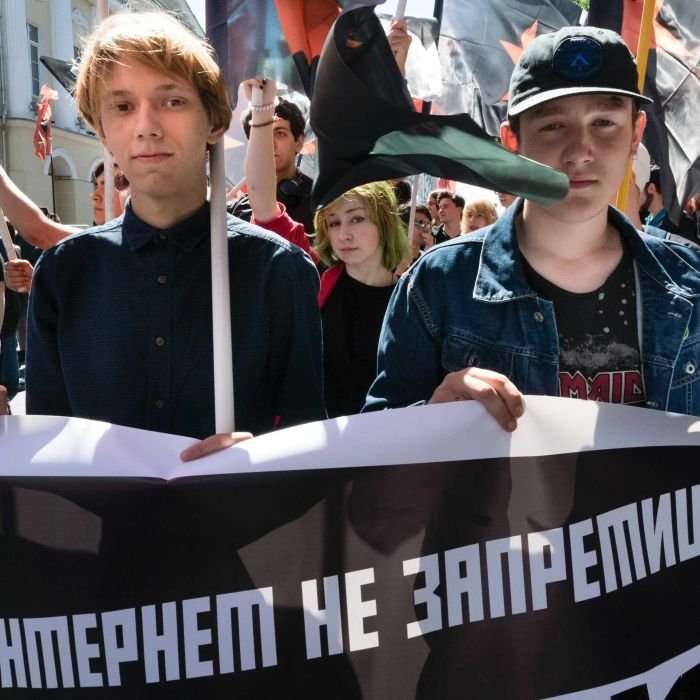Thousands march through Moscow for internet freedom as Russia cracks down ahead of election
More than 2,000 people have marched through the streets of Moscow to demand an end to efforts by Russian authorities to control and monitor what is posted online.
Protesters yelled slogans including, "Truth is stronger than censorship" and, "Free country, free internet", and a handful of people were detained.
For years, Russian authorities largely ignored the internet, preferring to focus on controlling traditional media, television in particular.
But it remains one of the few channels of communication available to those critical of the Kremlin.
Opposition politician and self-declared presidential candidate Alexei Navalny has more than 1.3 million followers on his YouTube channel.
Kremlin plays catch-up ahead of election
With presidential elections due in just eight months, the Kremlin is playing catch-up, introducing a flurry of new laws designed to bring the online space under its control.
Draft legislation currently being pushed through parliament aims to force VPNs to block sites on a black list drawn up by the federal media watchdog, Roskomnadzor.
The new bill would outlaw VPN providers refusing to do so, and attempt to block them.
Another law, now being put in place, demands internet providers keep a six-month record of all sites visited by users, and that all metadata be saved for three years.
It also requires messenger services to provide their encryption keys to allow the authorities access to private communications.
"One by one [the Government] is adopting odious, harmful laws that first they adopt — and then they think about how to put in place," Emil Khalikov, one of the organisers of the march, said.
"Our goal is to get these repressive laws repealed, that limit our basic needs guaranteed by the constitution."
Increasingly, internet users are being hit with fines and jail sentences for posting comments and videos labelled "extremist" by the courts.
In a report published last week, Human Rights Watch noted that between September 2015 and February 2017 the number of people jailed for extremist speech in Russia had jumped from 54 to 94.
More recently, 22-year old blogger Ruslan Sokolovsky was in May convicted of inciting religious hatred after he posted a video of himself playing Pokemon Go in an Orthodox church.
He was handed a three-and-a-half year suspended sentence, later reduced on appeal.
Questions remain over how laws will be enforced
Russia is not unique in its attempts to control and monitor what users do online, but Yulia Gorbunova of Human Rights Watch said the new laws were of particular concern.
"These steps are taking place in an environment where there are no legal safeguards," she said.
"There are no independent courts and a lot of these measures will be implemented without any judicial oversight."
Despite the time and money put into drafting and implementing these laws, big question marks remain over how they will be enforced.
According to independent IT expert Anton Merkurov, that is due to a lack of expertise on the part of lawmakers drawing up the legislation.
"These people are not professionals, they aren't competent, and they truly believe that if they publish a law [that says], 'We today restrict all services used to access restricted contact', it will work," he said.
But it may well be that these laws do not have to work in practice — they just have to be seen to be working.
"The authorities don't need to control millions of internet users," Ms Gorbunova said.
"They need to give very frightening verdicts and real jail sentences to a handful of people a year to show that it's not welcome to speak and say anything online."
Topics: internet-culture, information-and-communication, censorship, world-politics, government-and-politics, russian-federation

SalokinSekwah on July 24th, 2017 at 02:56 UTC »
Got a feeling that Russia Today won't cover this...
...And yep
batmans_scrotum on July 24th, 2017 at 02:09 UTC »
"Election"..... suuuuuuure
autotldr on July 24th, 2017 at 01:22 UTC »
This is the best tl;dr I could make, original reduced by 87%. (I'm a bot)
Extended Summary | FAQ | Feedback | Top keywords: law#1 internet#2 people#3 online#4 control#5